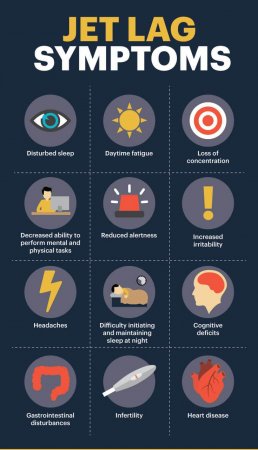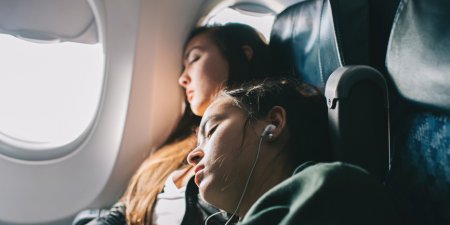Jet Lag Symptoms and Causes
Jet Lag Symptoms and Causes
The jet lag syndrome emerged with the rise of long-distance air travel. Travel fatigue is different than jet lag, but both conditions have similar symptoms. Because long flights are often tiring and uncomfortable, and the dry cabin air contributes to dehydration, it may require some rest for your body to bounce back. Travel fatigue can be an issue whether or not you travel across time zones. Jet lag, on the other hand, happens because your body is no longer synchronized to the environment’s rhythms.
Symptoms of jet lag may include:
- disturbed sleep
- daytime fatigue
- loss of concentration
- decreased ability to perform mental and physical tasks
- reduced alertness
- increased irritability
- headaches
- difficulty initiating and maintaining sleep at night
Jet lag symptoms affect all age groups, but they may have more pronounced effects on the elderly, whose recovery takes longer than that of young adults.
The direction of travel affects the severity of jet lag symptoms. Travel across time zones, especially eastward, disrupts daytime rhythms. When we travel eastward, the length of day is shortened, and the circadian system must also shorten to re-establish a normal cycle. This makes jet lag and sleep disturbances worse after eastward flights than after westward flights.
Other symptoms of ongoing jet lag may include cognitive deficits, gastrointestinal disturbances, infertility and heart disease.
Natural Treatments for Jet Lag Symptoms
Here are natural ways to prevent and beat the symptoms of jet lag next time you’re getting ready to leave on a jet plane.
Hydrate
According to Harvard Medical School, being dehydrated can worsen the physical symptoms of jet lag . This is because dehydration may impair cognitive function, headaches, impair digestive function, and make you feel even more fatigued. It is therefore important to keep adequately hydrated before your trip, and drink plenty of water during your flight.
However, your water requirements will increase if you have a high activity level and if you drink dehydrating beverages, such as coffee and alcohol. So while the in-flight bar service can be oh-so-appealing, it’s best to avoid alcohol (and coffee) during your flight.
Rest Up Before Your Trip
Understandably, preparing for travel can result in late nights and trying to cram last minute tasks into busy days. But since jet lag leaves you feeling fatigued, it’s important to do all you can to be well rested before your flight.
If it’s difficult for you to add a few extra hours to your sleep routine, you can try improving the quality of the hours of sleep you do get instead. Avoiding caffeine past 2 pm, turning off all electronics before bed, and exercising in the afternoon are all easy ways to improve the quality of your sleep.
Adjust Your Sleep Schedule 1-2 Weeks Before Traveling
While it’s unrealistic to follow the exact sleep schedule of a new time zone, it can help to make slight modifications to your bedtime a few weeks before traveling. For example, if you’re traveling east and you’ll be losing 7 hours, try going to bed an hour earlier. If you’re traveling west and you’ll be gaining 7 hours, try going to bed an hour later.
Sleep on the Plane (And Don’t Forget Your Sleep Mask)
In general, traveling is tiresome—even if you’re not at risk for jet lag. However, sleeping on the plane is especially important if you’re traveling east because you lose several hours of rest.
Wearing a sleep mask can help you rest easier during your flight, as well as avoiding caffeine, energy drinks, and refined sugar, which can keep you awake.
Take an Adaptogenic Herb
Adaptogens are herbs that help your body cope, or “adapt,” to stressful situations by regulating your body’s stress response .Since jet lag is a form of stress on your body, adding a stress protective nutrient to your supplement routine before and during your trip may help reduce the negative effects of travel. In addition to ginseng, other popular adaptogenic herbs include ashwagandha, rhodiola and maca root. Since adaptogens may interact with certain pharmaceutical drugs, always be sure to check with a qualified healthcare practitioner prior to taking a new supplement.
Eat a Nutritious Meal After Landing
Avoiding junk food and instead, eating a well-balanced meal after your plane touches down, may also help reduce the symptoms of jet lag. And while any vitamin and mineral-rich meal will help support your body on a nutritional level, some nutrients are more helpful than others when it comes to adjusting your sleep schedule to a new time zone.
For example, carbohydrate-rich meals cause fluctuations in your insulin levels, which can leave you feeling drowsy . Therefore, if you arrive to your destination in the evening, having Paleo-friendly carbs, such as sweet potatoes and squash, may help you fall asleep sooner.
If it’s daytime when you arrive—and all your body wants to do is sleep—ordering energizing foods such as greens, fruit and vegetables can help provide you with the sustainable energy you need to last until bedtime.
Use the Light and Dark to Reset Your Sleep Schedule
Avoiding light and darkness at appropriate times can help your internal clock adjust. For example, when flying east, you may get off the plane when it’s 7 am, but your body may think it’s 11 pm. And while your internal clock may tell you to look for darkness so that you can sleep, it’s best to avoid closing the curtains in your hotel room and instead let the light shine through. This will signal to your body that it’s daytime, which will help your internal clock readjust to the time change.
Meditate
Meditation is commonly recommended as an effective remedy to minimize jet lag. This is because some studies have shown meditation can help relieve insomnia, improve sleep quality and may even relieve digestive symptoms.
There are many different forms of meditation. You can meditate simply by closing your eyes and focusing on your breathing for twenty minutes (which can be done at the airport or during your flight) until you feel like you’ve reached a relaxed state. iTunes also has guided meditation tracks specifically for jet lag that you can download to your smartphone.
There are several free meditation apps you may also enjoy using, such as Calm and Headspace.
A few other common recommendations for dealing with jet lag include avoiding naps during the day and incorporating relaxation techniques before bed such as gentle yoga, or having a warm bath. And hey—at the very least, being jet lagged is a great excuse to treat yourself to that Swedish massage.
- Health / Disease
- 2-12-2016, 19:23
- 2 429
- Pharmatic









